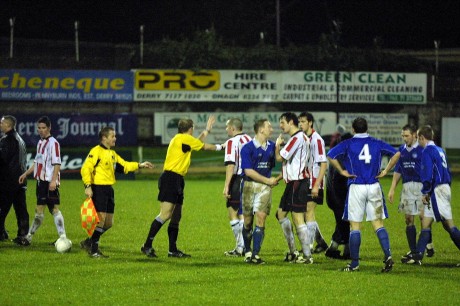
Tempers fray during the second leg of the play-off in 2003.
BY CHRIS MCNULTY
SHAUN McGowan made the familiar walk as part of a fortnightly football ritual all his life: Swinging between the gables at ‘Cheers’ on the Main Street, the step quickening as he bobbed down Navenny Street, the neck craning ahead as he passed Heaney’s U-Drop Inn and Gallen’s, the public houses of the time that were packed-to-overflowing when Finn Harps had a big match in Ballybofey.
The night of December 9th 2003 was different.
For years, McGowan’s journey took him inside the Navenny Street entrance of the ground where he was a programme vendor.
On this night, he veered left a few yards earlier: In the door marked ‘players and officials’.
Shaun McGowan, Ballybofey born and bred with the veins bleeding the blue of Harps, was in the squad for the night of nights.
Finn Harps were bidding to end three season in the First Division. They’d beaten Bray Wanderers in a promotion-relegation play-off semi-final.
Meanwhile, Derry City overcame Limerick FC in the other semi-final.
Two legs that remain logged at the forefront of the memory followed. Finn Harps versus Derry City, it was one of the ultimate grudge matches: Harps with a chance to relegate their derby rivals; Derry bidding to trample a little further on the pebbles upon Harps’ grave.
“This was the biggest game in Finn Harps’ history,” says McGowan.
“Paddy McGrenaghan was telling me how it was a bigger came than the FAI Cup final: Not just the chance of getting promoted, but the chance to do it by relegating Derry!”
* * * * *
THREE months previously, Noel King was unveiled as the surprise choice to take the reigns at Finn Park following the sacking of Jonathan Speak.
The Harps Board were concerned at results and turned their eyes to King.
The Dubliner came in and led Harps to the play-offs. King’s mantra was all about accentuating the positives.
In the play-off semi-final, Damien Whitehead netted the only goal of the first leg as Harps defeated Bray in Ballybofey. At the Carlisle Grounds in the return leg, Kevin McHugh doubled Harps’ lead.
At half-time, Shane Bradley was urging his team-mates not to let it slip, reminding them of the dangers of a two-goal lead.
“Noel absolutely went through me for a near-cut,” Bradley says.
“‘What the f*** do you mean?’ he was shouting. ‘We have two and they have nothing. We’re in control here boys’.
“Noel was always very upbeat. I remember my wife, Rosaleen, was pregnant at the time and Noel was making sure everything was ok all the time. He was very understanding. His attitude was that if players were happy at home, they’d be happy on the pitch.”
Whitehead added a second Harps goal and their reward was a mouth-watering clash with Derry.
Before the first leg in Ballybofey, King turned up the heat on an already bubbling pot.
The subplots were in vast supply: King had been Derry’s manager when they got out of the First Division in 1987; Gavin Dykes was the Derry manager in 2003 and only happened to be a former Harps player and manager; for good measure, there were plenty of other connections including the Harps squad containing former City players Gary Ramsey, Declan Boyle, Donal O’Brien and Tom Mohan.
King’s side had the winning momentum from the first Division and he sought a means of increasing the pressure on Dykes.
“I don’t want to be the manager that relegates Derry but I just think it is an unstoppable force,” declared King. “I believe it is destiny that Finn Harps are going up. I do believe that and I think Gavin Dykes is starting to believe it also.”
Dykes imposed a media ban on his players in an attempt to shield them from it all.
The stakes did not need explained, though.
“We did very well to even get a play-off,” Dykes says now, ten years on.
“We had to win below in Waterford on the last day of the season to even get into the play-offs and we managed to do that. We got over Limerick and then it was Harps.
“There was huge pressure. We knew what it would mean if Derry City was relegated. We didn’t have to spell it out to anyone in that dressing room.”
In the home dressing room, King’s words struck a chord.
“He spoke about destiny in the dressing room, too,” Bradley remembers.
“He firmly believed that we would do them. We started to believe it. I think the plan was that if he could get into the head of any Derry player that their whole thing would crumble.
“The atmosphere that night was red hot. It was unreal.
“I remember the lead-up to the game and there was such a buzz about it in the local papers and everyone you met on the street was talking about it.
“We didn’t need motivating, put it that way.”
McGowan was still coming to terms with it all.
A popular figure among the home faithful he was well-known to all who turned the turnstiles on the stand side, but here he was, lacing his boots to take his place on the bench.
“To be a part of it was just amazing, to walk down the tunnel as a Harps player on that night…a special night,” says McGowan, a regular member of that vocal band of Harps followers whose tones filled the air in those times of hope by the Finn.
“For seven or eight years, I was going around the country on the Supporters Club bus. Now, here I was as a player and looking up to the stand to the group I always stood with. It was hard to go from supporter to player and back to supporter again within a few days.”
* * * * *
EIGHT minutes from the end of the first leg came a spurned chance that would be remembered with great agony by the Ballybofey firesides that winter.
Former Candystripes Boyle and O’Brien combined to create an opportunity for Damien Whitehead at the River End. ‘Keeper Alan Gough was grounded, but the Englishman failed to beat Eddie McCallion, who was standing on the goal-line.
“Even I could have converted that chance,” King said through gritted teeth afterwards.
“It was a great chance to put us one up,” says Bradley.
“It was so close: Maybe a half of an inch here or there and we’d have been ahead. Imagine if we’d been going to the Brandywell a goal up…”
McHugh had warmed Gough’s hands earlier, while the Killea man dragged another half-chance wide and Niall Bonner, surely one of Harps’ greatest unfulfilled potentials of his or any era, flashed a snap-shot just over.
“We left with a lot of regret after the first leg,” says McHugh.
“Mind you, the main thing was not to concede and we managed that. Still, we wanted a goal.”
“The place was electric. We gave it everything, but there was a part of us that just didn’t push on; maybe it was because of a slight fear of making a mistake,” Bradley says.
“We had been confident going into it. We came off the pitch that night disappointed that we hadn’t won the game. The game at Finn Park didn’t live up to the pre-match talk.”
Derry had chances themselves, but with Ciaran Martyn and Michael Holt suspended they were happy with their lot of a scoreless draw.
“We were quite happy and quite content to come away from Ballybofey with a draw,” says Dykes.
The night ended shrouded in controversy when the referee Eddie Barr signalled full time with the clock showing ’89’.
King also lamented an incident when he claimed Gough had handled the ball outside his penalty area.
It was footnote in comparison to what would follow four nights later.
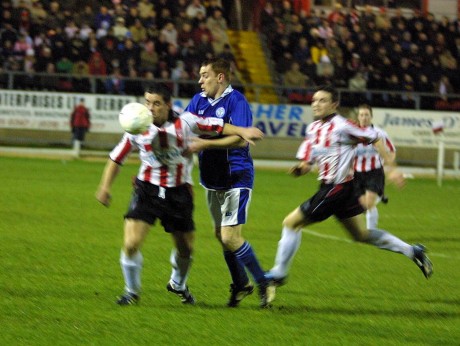
Niall Bonner in a tussle for possession at the Brandywell.
* * * * *
THE night of December 13th 2003 is one of those ‘where were you?’ moments for local soccer fans.
“Ballybofey was at a standstill,” McGowan remembers.
“You just couldn’t escape it. Everyone was talking about it; everyone wanted to be a part of it.”
McGowan had been playing for the club’s Under 21 team and impressed in a Cup tie against Bohemians, scoring twice and earning a call-up from King.
The transformation between supporter and player was something that didn’t faze him.
“I was back among them for the second leg again,” he says.
“The Harps support that night was unreal – the best I ever seen.”
Around 2,000 Harps supporters are estimated to have been in the Brandywell that night.
Just thirteen minutes in, Derry finally broke the play-off’s stalemate. Sean Hargan’s throw-in found its way to Mark Farren. The former Harps conscript steer past Ramsey on a horribly wet, windy night that seemed the perfect stage for these two to fight their dual.
“Mark turned home and that settled things,” Dykes says.
“It was nervy and it was edgy. We had real experience in there, with Peter Hutton, Liam Coyle and Sean Hargan. That really helped when it came to the crunch.”
Derry failed to put the game to bed, though and the tension thickened as Alan Kelly’s watch ticked on.
From his own goal-line, Jonathan Minnock headed a Farren effort out and Martyn smacked an effort off Ramsey’s crossbar.
The game clock was deep in red time, hundreds of Harps fans had left to the taunts of the Candystripes.
“We always hoped and always believed,” says Bradley.
* * * * *
FIVE minutes and nine seconds into added time, Harps hit one of the most memorable goals that has ever been scored in the club’s 59 year history in the League of Ireland.
Paddy McGrenaghan prodded and probed deep in City territory.
McGrenaghan picked out Tom Mohan on the edge of the box. Facing away from goal, Mohan rolled the ball neatly to his left-hand side where a team-mate was poised to have a go.
“I knew that this was ‘it’,” says McHugh.
“The game had passed by so quickly. Big games tend to do that.
“We threw everyone up. We just had to go for it.”
McHugh lurked around the edge of the box. On viewing the footage, you might observe that it’s a peculiar position for a striker so deadly within the 18-year box’s confines.
“I have a wild habit of doing that,” he say
“It’s usual for strikers to sneak in around the back post for the tap in, but so many balls are cleared out to the edge of the box. I always got a lot of joy from there and Derry were clearing everything we threw in.
“Tom laid it back and I just said to myself: ‘Hit the target with this’.”
Bradley and Boyle were up from the back as Harps poured bodies forward for one last throw of the dice.
“I was facing away from goal and just thought: ‘Jesus, that’s going in!'” Bradley says.
“I turned around and there it was, flying into the net. When it went in it was a case of: ‘Kinger was right, maybe this is destiny after all.’”
“I couldn’t have caught it any sweeter,” McHugh says.
Dykes had a perfect view from the Derry dugout.
As the net rippled, hundred of Harps fans streamed back in through the gates. Legend has it that some fans from border villages were actually back at home when McHugh netted.
Dykes was stunned: “We looked to be done and dusted. It was a fabulous goal by Kevin.”
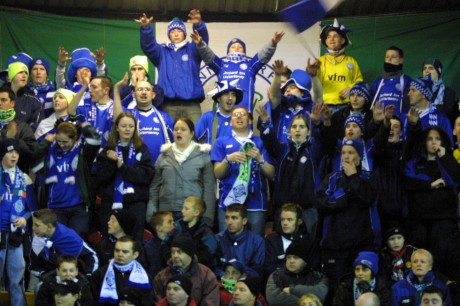
Finn Harps fans in full voice at the Brandywell in 2003. Panelists Shaun McGowan, Chris Breen and Martin Ferry are included. Behind McGowan, on the right, is Donegal News sports reporter Chris McNulty.
* * * * *
MCHUGH and King had a rendezvous at the pre-match meal in the Frontier Hotel, Bridgend. King wondered of his striker what his celebration would be later that evening.
It got McHugh thinking.
As soon as the ball left his instep he knew he’d nailed it.
Away he went, with Kenny in pursuit for that on-all-fours celebration on the Brandywell’s dogtrack that went down in Harps folklore.
“Noel was always into the psychology of it – he probably couldn’t have cared less about a celebration, but it was all about making me believe that I was definitely going to score,” McHugh says.
“For about four or five seconds I was on the track. There were all sorts coming down on me, coke cans, pound coins, you name it.”
It took some time for the bedlam to lift. There was still business to attend to.
Had away goals counted, Harps would have been on their way up. As it was, they were heading for extra time.
* * * * *
DYKES had been in many sticky wickets during his career, but this was up there with the most intense.
He had been assistant manager to Dermot Keely at City and took over when Keely’s tenure ended after only three months.
He looked across the pitch and saw some of those men he’d been in trenches with before.
“It was strange,” he says.
“I had some great years in Ballybofey alongside some of the boys who were playing for Harps, like Declan Boyle, Tom Mohan and Donal O’Brien.”
This was no time for sentiment.
Dykes gathered his men in a circle and got to work.
“It was probably the best speech I have ever given a team,” he says.
“I vividly remember hammering home the point that we were the home team, that we could just go out and buckle, that we could go out and just give up and feel sorry for ourselves or we could be brave and go finish the damned thing. I told them to keep doing the right things, to be patient and they’d get the breaks.”
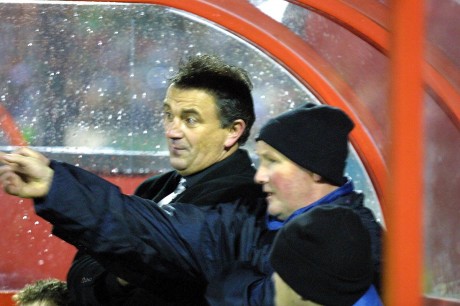
Finn Harps manager Noel King and his assistant Sean McGowan at the Brandywell.
* * * * *
IN the 101st minute, Derry were awarded a free-kick in the middle of the park, while attacking the Brandywell Road end of the ground.
As referee Alan Kelly blew the whistle to signal the free, the ball rolled out to the right. Gareth McGlynn jogged onto it and played a quick-fire kick into Martyn’s path.
Some Harps folk still cannot click play on the YouTube that shows what happens next: Martyn’s first-time cross was flicked beyond Ramsey by Liam Coyle. Eloka Asokuh and Boyle both tried in vain to clear it, but the ball trickled over the line.
“I knew he was taking it from the wrong place,” Bradley says of the free kick. The feeling now is that perhaps the incensed response of the Harps player had blurred the concentration.
“I think Luca and Deckie just got their wires crossed. Some men thought the whistle had gone for a penalty.”
In the 89th minute, with Derry leading 1-0 the board went up and Coyle was sent on for Farren.
“I thought I was going on for five minutes, hold the ball up in the corner and walk off to a hero’s reception,” he says.
“It turned out to be an eventful half an hour.”
And he still managed to walk off to the hero’s reception.
Dykes says: “I basically turned to Liam Coyle and said: ‘Go do what you have to do. Talk about big games, big goals and big players – that was Liam just doing what he did.”
Talk about a storybook ending: The goal was Coyle’s last and the game his last in the Candystripes.
* * * * *
THE atmosphere turned to poison for the remainder.
It was hostile – on and off the field.
Three red cards were flashed by Kelly to Harps.
First to go was King, banished to the stand for voicing his displeasure at the goal incident to the referee at half-time in extra time.
Then went Bradley, sent off for an over-zealous challenge on Martyn.
“Ciaran was coming towards me and we both went for the ball in a similar way,” he says.
“The two of us went and he got up giving out to me, I pushed him and…The referee said he was sending me off for the tackle. I had to make the tackle. If he’d got the ball he could have went on himself or played in Coyle who would have been one-on-one.”
He made the long walk and had to suffer for the remainder of the game. It was in an age before the smartphone and he wasn’t permitted by stewards to watch from the tunnel.
“I was sitting back in the dressing room on my own when McHugh walked in. He’d been sent off as well.”
McHugh walked for an off-the-ball clash with Robbie Hedderman.
“The extra time was crazy,” he says. “No joke, I only saw a re-run of the events four or five years later. It was that long. I always kind of thought the reaction of Harps people was, in a way, sour grapes. When I saw it, I was sick. The referee made a complete hames of it.”
The team-mates sat on the wooden benches
It was the longest of ten minutes.
“We had no way of knowing what was happening,” Bradley says.
“We were just listening to the roars of the crowd but you sort of knew that there were no goals because there no wild massive shouts. There was anger at the goal. We just felt that there had been a complete injustice.
“We had played better than Derry over the games. At the end there was a feeling that it wasn’t really our fault that we hadn’t won. It was a hateful way for it all to finish.”
The incident that led to Bradley’s red card sparked a mass melee, involving both players and officials from both camps. Local photographer and Harps fanatic John Foy found himself removed from the pitch after encroaching onto the pitch during the spat.
The feelings were bitter and tensions between the clubs soured. Harps penned a letter asking that the PSNI be required to police games at the venue in future, Derry came under fire for having played Baa Baa Black Sheep over the public address system beforehand, something for which the Derry Chairman, Jim Roddy, issued an apology for.
* * * * *
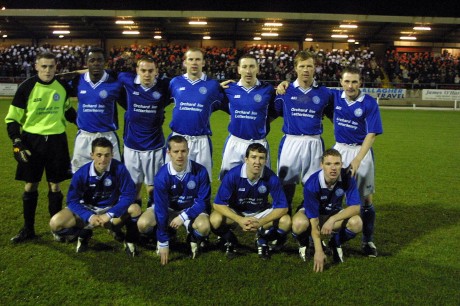
The Finn Harps team before the second leg against Derry City
DYKES was a relieved man – and couldn’t resist firing a barb at King post-match.
“I said to Noel: ‘You were right, this is destiny!’ We’ve had a laugh about it all since then,” he says.
By the following June, both Dykes and King had left their respective posts.
Stephen Kenny took over at Derry, after Peter Hutton filled a caretaker’s role for a time, and he led Derry to some magical night.
A year after the play-off saga, Harps were heading for the Premier Division after winning the First Division title. King had agreed to stay on in the wake of that defeat by Derry. “We all stayed because Noel was staying,” Bradley says.
He left early in 2004 as he was finding the commute an increasing burden. Felix Healy was appointed as his successor and led Harps to their League win.
“We actually grew in confidence because of that play-off,” says Bradley.
“It probably sounds strange, but it helped us. At the time you wouldn’t have though it. But when we came back for the following season we took a lot of energy out of that night in the Brandywell.”
Receive quality journalism wherever you are, on any device. Keep up to date from the comfort of your own home with a digital subscription.
Any time | Any place | Anywhere









